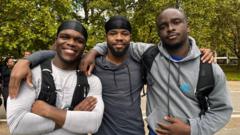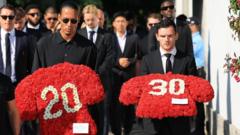In London's iconic Hyde Park on a fresh Saturday morning, a vibrant gathering unfolds as the Ozo running club, comprised mostly of Nigerians of Igbo descent, takes shape. Co-founded by Chibueze Odoemene, Emeka Atumonyogo, and Chigo Ogbonna, the club aims to create a sanctuary for young Igbo individuals to connect with their heritage. This community has rapidly amassed over 300 members in less than three months, reflecting the broader trend of a 59% annual increase in global running club participation, as noted by the Strava app.
Running Cultural Roots: The Ozo Club Unites Igbo Nigerians in London

Running Cultural Roots: The Ozo Club Unites Igbo Nigerians in London
A newly formed running club celebrates Igbo culture while promoting fitness and community among Nigerians in London.
As runners prepare to split into various pacing groups, the air is charged with a joyful atmosphere, amplified by the rhythmic beats of Afrobeats music. Mr. Odoemene initiates a call-and-response chant, "Igbo kwenu!" met with a resounding "Eyy!" from the gathered members, symbolizing unity and shared identity among participants. Beyond fitness, the Ozo running club serves as a platform for forming meaningful connections, fostering friendships and even potential romantic relationships.
The desire for cultural connection is echoed by members like Francesca Ngozi Ezennolim, who traveled from Reading to find more Igbo friends, citing the challenge of connecting with her tribe in a diverse Nigerian diaspora. While the Igbo people face cultural threats reflected in predictions of language extinction, their presence in the UK has grown. Simultaneously, other Nigerian ethnic groups, like the Yoruba community, have seen a decline in speakers.
In response to the question of whether focusing solely on Igbo culture fosters division, the club's founders clarify that everyone is welcome to join, encouraging an exchange of cultures. Despite the joy found in the club, there lingers a historical weight stemming from the Biafran war, which has left scars on the collective memory of the Igbo people. Members express a yearning for greater representation amid a backdrop where Yoruba culture often takes precedence.
This sentiment is underscored by Uzoma Ehziem, who believes Igbo culture deserves more recognition in the global narrative of Nigeria. The Ozo running club goes beyond fitness, planning monthly outings and an Igbo gala, thereby enriching members' experiences. As members conclude their run, the rhythmic chants resonate once more, emphasizing that their gathering cultivates not just fleeting encounters but lasting friendships rooted in community, culture, and pride.
The growing sense of belonging among the members instills hope and determination to keep the spirit of Igbo culture alive in a vibrant and active diaspora.
The desire for cultural connection is echoed by members like Francesca Ngozi Ezennolim, who traveled from Reading to find more Igbo friends, citing the challenge of connecting with her tribe in a diverse Nigerian diaspora. While the Igbo people face cultural threats reflected in predictions of language extinction, their presence in the UK has grown. Simultaneously, other Nigerian ethnic groups, like the Yoruba community, have seen a decline in speakers.
In response to the question of whether focusing solely on Igbo culture fosters division, the club's founders clarify that everyone is welcome to join, encouraging an exchange of cultures. Despite the joy found in the club, there lingers a historical weight stemming from the Biafran war, which has left scars on the collective memory of the Igbo people. Members express a yearning for greater representation amid a backdrop where Yoruba culture often takes precedence.
This sentiment is underscored by Uzoma Ehziem, who believes Igbo culture deserves more recognition in the global narrative of Nigeria. The Ozo running club goes beyond fitness, planning monthly outings and an Igbo gala, thereby enriching members' experiences. As members conclude their run, the rhythmic chants resonate once more, emphasizing that their gathering cultivates not just fleeting encounters but lasting friendships rooted in community, culture, and pride.
The growing sense of belonging among the members instills hope and determination to keep the spirit of Igbo culture alive in a vibrant and active diaspora.





















